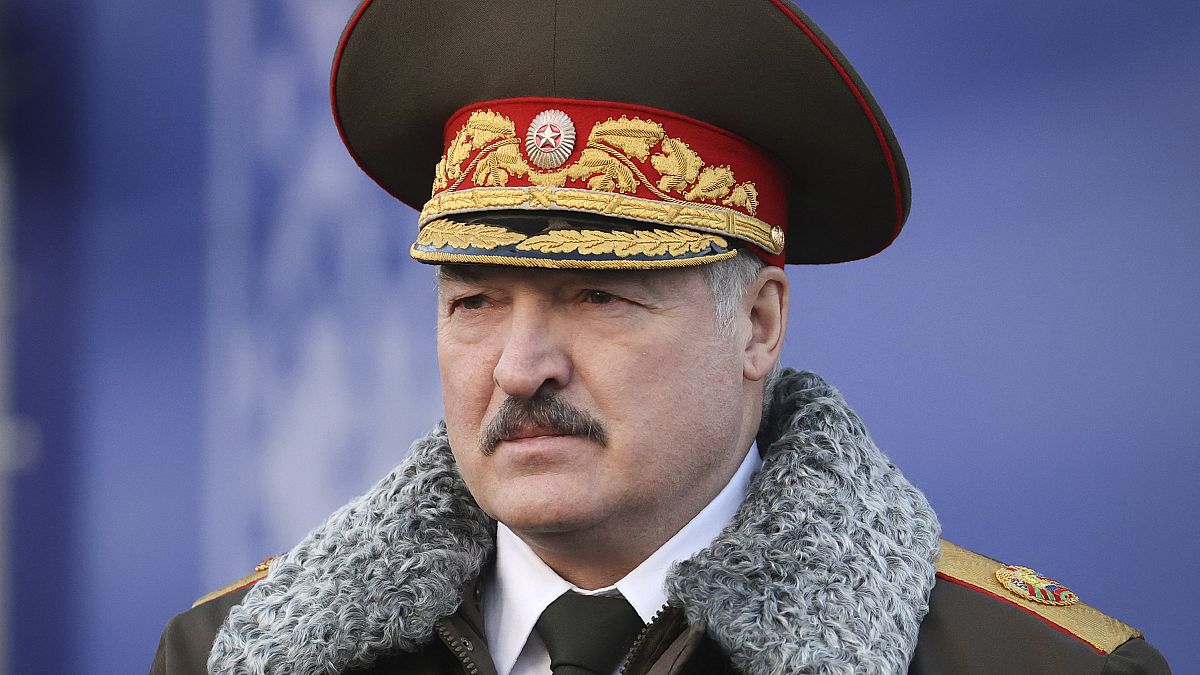"Journalistic work is clearly being criminalised," the Eastern Europe head at RSF told Euronews.
When friends didn't hear from Belarusian journalist and media manager Andrei Alexandrov on January 12, they didn't immediately raise the alarm, dismissing his lack of communication for several plausible reasons.
"Andrei disappeared from messages, which was highly unusual," Belarusian journalist Maryia Sadouskaya-Komlach told Euronews. "We were in the middle of a conversation exchanging some information that he asked me to send him and then he suddenly disappeared."
The reporter, also Eurasia programme coordinator at Free Press Unlimited, said she realised something was wrong when she spoke to friends "and we realised that he disappeared from the radar from all of us simultaneously and that no one else could contact his girlfriend".
His whereabouts only became clear when the director of BelaPAN, an independent news agency where he freelances, went to the police to file a missing person's report after his family and colleagues had not heard from him for nearly 24 hours, the agency said.
As it transpired, Alexandrov was in the Oktyabrskiy district police department in Minsk. He and his partner had been detained as suspects in a criminal case initiated by authorities for "organising and preparing activities that breach public order or active participation in them", his lawyer told BelaPAN.
He is one in a line of media professionals in Belarus who have seen criminal charges brought against them in recent months.
Authoritarian President Alexander Lukashenko's declaration of victory in the country's August 9 election, which the opposition disputes, sparked mass protests in Belarus that still rage on each weekend.
There have been claims of police brutality, mass arrests, as well as a reported crackdown on the free press in response to the demonstrations, with many opposition figures detained or fleeing the country.
At least nine journalists have had criminal justice proceedings opened against them since November, according to data Reporters Without Borders (RSF) collected in coordination with the Belarusian Association of Journalists (BAJ).
"Journalistic work is clearly being criminalised," Jeanne Cavelier, the Eastern Europe head at RSF, told Euronews, adding the Belarusian authorities were using the charges as a "tactic to shut down the press".
"This is really very worrying," she said. "I think very serious charges against journalists are another trend now."
While arrests of journalists were at their peak in the wake of August's contested elections, few were jailed or saw criminal charges brought against them, she said.
"The proportion of journalists jailed after arrests increased fivefold between August and November," she added. "Fewer people are being arrested in general but for those who are the consequences are more serious" and the arrests are "more targeted".
This is significant, according to Cavelier, because when criminal charges are brought forward after a person has been arrested in Belarus, they can be held in a cell for significantly longer - sometimes "over 15 days" - than cases where they are not.
She added that RSF called for the "immediate and unconditional release" of Alexandrov and the other Belarusian journalists who were in "arbitrary detention" and that her organisation will file a complaint with the UN's protection mechanism concerning their cases.
Who has been jailed and under what circumstances?
Last month, five people from the Press Club Belarus, an organization that provides resources and training for independent media, were arrested.
Founder Yulia Slutskaya, programme director Alla Sharko, cameraman Pyotr Slutsky and financial director Sergei Olshevsky, were all charged with large-scale tax evasion and will remain in custody in a Minsk jail until February 23, the organisation said.
Programme director Sergei Yakupov was not charged but deported to Russia on December 31 and banned from entering Belarus for 10 years, it added.
"For about a day, neither lawyers nor relatives could find out where the detainees were," the Press Club Belarus said.
In Alexandrov's case, his lawyer could not share further details of his situation with his employer or family as she had signed a non-disclosure agreement, BelaPAN reported.
"This has been very frequent recently; people who are under persecution from the Belarusian government and are arrested or detained are forced, along with their lawyers, to sign a non-disclosure agreement so it's only the government who can tell you actually what the person is accused of," Sadouskaya-Komlach said.
Most dangerous country in Europe for journalists
The jeopardy reporters in Belarus faced skyrocketed in Belarus last year, with RSF data showing it was the most dangerous country in Europe for journalists in 2020.
As many as 450 press freedom violations were recorded in the four months after the disputed reelection of Lukashenko, a report from the organisation said.
The number of journalists arrested in the country totalled 370 from August 9 to the end of the year.
Data collected by RSF and the Belarusian Association of Journalists showed police deliberately used violence against reporters covering demonstrations “with the clear aim of gagging the media and making protests ‘disappear’”, the report stated.
It is now "becoming increasingly unsafe for journalists inside Belarus to do their work", Sadouskaya-Komlach said, citing the danger of facing prosecution and "several years in prison".
She called upon the governments of the EU, US and UK to "show that they care" by making official statements directed at the Belarusian government "to stop the violation of essential press freedoms and demand the release of people".
"Journalists are not criminals," the reporter added.
